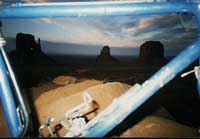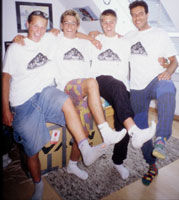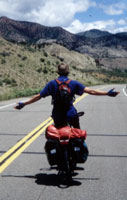Info
3, January '99 Andreas
Schier
New Ways in Waldorf Pedagogics - School on the Road
This is only for those who really want to - otherwise it is
too tough. But it is about three months of intense living and
joy. That is how the Waldorf teacher Andreas Schier is taking
students on bicycle trips, covering new territory in education
and relationships with adolescents.
....
During the spring of 97 I taught - after preparing the trip for
nine months - as a travel teacher for the first time. Taking two
American teenagers, juniors from public schools in the States,
we were on the road in Europe for 3 months. Several severe mistakes
were made. The basic concept was developed one year before I joined
in. I didn't realize that the parents had worked on the concept
with the students expressing their agreement, while they secretly
planned a different trip on their own. Great problems arose when
the difference between concept or expectation and reality of the
trip.
Furthermore, I had
happily agreed that I could teach and grade one of the students
in several subjects, as long as I documented in detail and taught
as close as possible to the curriculum. But we found out during
the trip that this agreement was far too much oriented on the
classroom. My idea of traveling by car instead by train was realized.
It was obviously cheaper and more flexible, but it turned out
that is was too easy and passive for the girls. Moreover, one
of the students realized too late that she couldn't keep her usual
attitude towards teachers on this trip.
The biggest success
of the entire trip was therefore the incredible learning out of
the mistakes. And the students continued their travel for six
more weeks alone --even though they'd never traveled without their
parents before - since they had reached a high level of independence
in this area.
The experience led me to change several basic aspects of my concept
for the following three months bicycle trips through the States:
Taking 6 to 8 students at a time and switching from the pedagogically
questionable car to the highly pedagogical bicycle. It allows
students to be constantly active, independent and responsible
for their own gear. In the beginning, I am in charge of the budget
until the students are ready to take over. The total budget has
to be tight, so that inconvenience and laziness can't be matched
through higher expenses.
The school stuff is
greatly reduced, because traveling - especially by bicycle - is
a learning experience, and book learning often doesn't fit to
the nature of traveling. For example, being a certificated English
teacher, I only tell good students, and those only sometimes,
about their mistakes in grammar; but after an introductory period
of three weeks I speak only English to the students instead. Fear
of making mistakes is the biggest hindrance in learning a foreign
language on the road. The students get the basics of American
history from me, while they chose biographies. They are giving
their talks during the first month of a trip.

Monument Valley, seen through a bicycle frame
For a bicycle trip with high school students three months seem
to be optimal; having more time it'd be possible to integrate
volunteer work at a project. Three months correspond with a season.
It's possible to go through deep experiences in this period. The
long duration of a trip is also important to enhance perseverance
decisively. And experience also showed that students did well
making up for the stuff they missed at school.
Participating students
are not only at the top of their class. Students and parents from
10 different waldorf schools all agree that the trips have been
highly successful. Therefore it seems difficult to understand
at first that, the faculties are not interested in these experiences
becoming better known and reachable for more students - through
slide shows for the whole high school, for example. One reason
is certainly that most Waldorf teachers are overworked. Then there
is insecurity what might come out of these experiences and how
to react. Is it possible that today's structure of school is loosening?
The classmate of one
particpants asked the faculty for the allowance to work at a social
project in San Francisco for three months. The teachers were a
bit at a loss. On the other hand, the business world doesn't get
tired expressing that knowledge is only one needed aspect, like
flexibility, an independent personality and team work. How can
these capacities be enhanced while the pressure for good grades
is growing?
How does a trip actually work? In the beginning, I take care
of all the duties basically, be it the budget and bookkeeping,
preparing and finding the route, shopping or finding a place to
stay and I think aloud a lot. At the same time, decisions are
made as soon as possible by the group. The students learn about
the difficulties of concensus. Depending on the situation though,
majority, minority or I decide. Important
presupositions for the independence on the road are a good and
awake handling of the bike and knowing how to read a map. An unwanted
detour is very helpful for this. Subsequently, we split up into
small groups for part of the day, soon whole days and finally
solo rides are possible. My job is "to get out of the way". This
is also done practically towards the end, when the group is ready
to cycle alone for a couple or few days.
This may sound too
adventurous at first. But the students are well prepared then
and very grateful for the trust given to them. Moreover, the US
is not, as many Americans think, a generally dangerous country
at all. It all depends on how one is acting and where to be when.

having just returned to Germany
Not much is happening to strangers and if so, a grave mistake
was made usually. Traveling like we do, the trust in the world
is growing - and it is not a blind trust. Last trip we stayed
overnight privately 20 times (!) - mostly invited spontaneously
- to camp out in the yard, sleep on the floor or even in beds.
The hospitality is one of the greatest gifts that we receive.
Our nights camping in nature remain unforgettable - in warm nights
without tents - be it at the Pacific Coast, in the vastness of
the Southwest or the Rocky Mountains.
Our daily budget of
$ 12 per person is mainly used to fill our hungry stomachs. Some
moneys goes for campgrounds in national or state parks; at times
even with showers. But football fields of schools (unofficially,
during summer vacation) and churches prove to be great spots for
the night as well.
By now, I put great emphasis on riding 55 to 60 miles per day.
It makes the cycling so much easier, and it's no problem to have
single students cycle up to 125 a day, if they want to find their
limits. Every trip is very different because of the participating
students. We can take the liberty to acknowledge individual desires
and needs.
It's a rule on all trips that students cannot use phone, fax
or email to contact family and friends at home. It gives the students
the possibility of developing more independence. The parents show
their trust and practice "letting go". The students write letters
and postcards as often as they want to, while parents and friends
get "only" three mailing addresses. And we truly celebrate on
those three occasions.
These trips are not cheap, but inexpensive; with my pay being
below that of any Waldorf teacher. Trips planned for 1999 cost
up to $ 2,200, to the States $ 2,700, plus pocket money and gear.
Getting the gear is very inexpensive when bought or lent from
former students. And during the last trip we saved $ 500 to be
given to a student of the next trip as a scholarship.
What is planned for 99? Two possibilities for each of the so
called spring and fall trip: students and parents make the final
decision of where we're going.
One option for the
spring - April, May, June - is a trip to the States again. This
time exploring the East Coast: From New Orleans through the "deep"
South, the Appalachian Mountains, civil war battle fields and
Washington D. C. to New York City.
The other option is
Turkey: country, culture and religion of 2.3 million Turks living
in Germany. Carsten, from the last trip, told me about his encounters
with young Turks. Usually, it's like "Why do you stare at me?
Fuck off!" Imagine he'd know some Turkish and would tell aout
his trip! So, the Mediterranean Coast, Anatolia, Capadocia, Black
Sea Coast and finally Istanbul.
For the fall I am planning
to travel to Southwestern Europe. The theme of the trip is "ecumeny":
a visit fo the Taize Community, the Central Massiv (mountains),
the area where Kathares (a Christian Community during the Middle
Ages) at the Northeastern side of the Pyrenees, the "El Camino
Real" (an old pilgrim's trail) to Santiago de Compostella in Northwestern
Spain and we might end up in Lisbon, Portugal.
The alternative is
Eastern Europe: Czech Republic (Prague), Poland (concentration
camp Oswiecim), Slovak Republic (High Tatra Mountains), Hungary
(Budapest), Slovenia and Italy (river Po). This is only for those
who really want to; otherwise it's too tough. But it is about
three months of intense living and joy.
Learning without a classroom - some background info
During my studies at the Mannheim, Germany, and Rudolf Steiner
college in Fair Oaks, California, I understood of Waldorf pedagogics
that the main goal is to foster the individual personality and
general capacities. Basic capacities like independence and responsibility
(two sides of a coin), activity, perseverance and hope (both are
needed to reach goals), trust into the world, love of nature,
creativity with others, the environment and oneself and to learn
"to live with the unknown" - no need for everything being planned
beforehand; inner instead of outer security.
My internships were spent mainly at a boarding school, since
I was searching from the beginning for a deeper connection with
the students like it's especially outside the classroom possible.
Inside and outside the classroom I observed especially with high
school students, that more than a few gained the conviction that
real life doesn't take place before after school. I know this
attitude very well from my own years at a public high school.
But according to my understanding and work as a teacher, school
means life and school of life.
What does today's life look like? It seems that our society -
in Germany and elsewhere - moved into many dead ends. It's most
obvious in our exploiting the earth, but also in other areas like
treating one another, people of foreign countries or supplying
the basic needs of all of humanity. I only see the possibility
of a "healing" future, if new ways and developments come forth
from the youth.
Talking with adolescents, I heard often that they don't have
any hope to change things to the better. The reasons given were
"that everything is fixed and declared for good" or "I am feeling
weak and helpless and have only few positive experiences to put
against this". Moreover, many adolescents complain that they need
outer pressure to become active and that they face great difficulties
to reach goals independently.

Andreas Schier (2nd from the right) "School on the road is
an alternative to classroom teaching"
Since I used to be a "full time" backpack traveler, I looked
into more experience oriented education. It is usually used wen
other measurements fail. The "problem" student - outwardly or
inwardly destructive, sometimes into drugs - spend time on a farm,
a sailing boat, a hospital in a third world country or learn how
to survive in nature.
All these experiences, participation on class trips and a thesis
about "drug problems at Waldorf Schools" led me to the question:
Why are those measures only taken when great problems are faced?
Why cannot "normal" students gain from these experiences?
The decision to become a "travel teacher" was clear. I used
to travel extensively before my studies and went to places and
countries for my internships. My own experiences were obvious,
the above mentioned general capacities are greatly enhanced through
traveling. Every student understands that "school on the road"
is deeply connected to life. And especially nowadays, a deeper
understanding of foreign cultures and knowledge of foreign languages
are important.
A further decisive aspect of travel teaching is the possibility
to work on a different student - teacher relationship. Being on
the road, I don't have to call the students attention on their
mistakes and often, since the world is working as a mirror and
leads to a direct experience. It is on the other hand important
to be quiet instead of saying "I told you before." At the same
time, I am partly a teacher, but also legal guardian, participant
or friend. Truthfulness becomes even more important, since everybody
gets "recognized" anyway.
The nature of the trips doesn't make it just desirable, but necessary
because of the great responsibility, that open and honest relationships
are developed. Attitudes like "as long as I don't get caught"
don't work, although smaller bendings of the rules happen; which
is important and right for adolescents. A "promise of honesty"
(instead of the "code of honor") is integrated: given only voluntarily.
Students report to me at the next opportunity, should certain
things have happened; they call it "to confess".
Living together so closely opens the possibility to pay special
attention to every student. Everybody has to be treated differently
to be true to the different needs and different personalities.
The students are truly co-organizers on such a trip unlike what
can be done in a classroom (usually). The work - cycling, travel
activities, covering of basic needs and "school stuff" - is agreed
upon by the students, but the actual doing and integrating leisure
time - "breathing out" - is more and more put into the hands of
the students. And it is very important that the students experience
free times for initiatives; free, because they don't have to be
used in a certain way.

Basti feeling free
Being a teacher, I try to become ever more aware of how I am
working with the students. When do I use reward, punishment or
other forms of pressure to influence? Do I take advantage of the
above mentioned inability to become active without pressure? Or
do I enhance real interest and integrity?
Moreover, I find it
important for a teacher to show my own vulnerability. It is so
much easier to teach when there's no expectation of making no
mistakes. A deep and human development is generally only possible,
when vulnerability and weaknesses are recognized as realities
and furthermore don't need to be hidden. It's not a question of
manipulation, but of understanding.
Some of the possibilities
mentioned in this article are reachable with small groups only.
A class with 3 or 4 teachers sums up to the same "quantity relationship",
let's say 1:8. But the teacher-student relationship is too distanced.
|